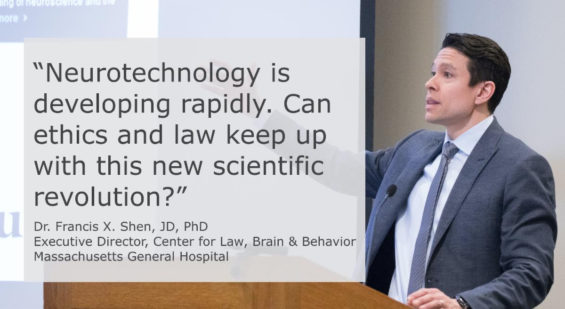CLBB affiliated faculty are offering classes in the intersections of neuroscience, law and ethics this semester. Read below for more information on these exciting opportunities to learn from the country’s leading thinkers in law and neuroscience.
Law and Neuroscience at Harvard Law School

The flagship seminar is Law and Neuroscience, open to Harvard Law School students. Law and Neuroscience is taught by Judge Nancy Gertner (Ret.), Senior Lecturer on Law at Harvard Law School and CLBB Managing Director. The seminar features a world-class roster of CLBB affiliated faculty and guest scientists to help explore core topics in law and neuroscience. CLBB Co-Director Dr. Judy Edersheim, JD, MD and CLBB Executive Director Dr. Francis Shen, JD, PhD, will be in class each session to provide medical and legal perspectives.
Course Type: Harvard Law School Seminar (2 credits)
Meeting Time: Thursdays, 5:15 – 7:15 pm
Instructor: Judge Nancy Gertner (Ret.)
Description: What’s going on inside the minds of criminal defendants? And what about the judges, jurors, and attorneys who adjudicate them? Are addicts responsible? Can violent offenders be rehabilitated? Do we have free will? How can neuroscience inform criminal sentencing? This seminar on law and neuroscience explores questions such as these through the innovative lens of modern neuroscience. The seminar features guest lectures by world-leading experts in neuroscience, and explores how criminal law’s ancient assumptions about human decision-making, emotions, and memory are increasingly being challenged by modern neuroscience through novel evidence and innovative legal arguments. Students will explore the legal implications of the neuroscience of hate, love, memory, lying, trauma, stress, violence, addiction, false confessions, adolescence, juvenile justice, and much more. We will look critically at efforts to use neuroimaging in court, and this will necessarily lead us to consider the relationship between law and science, more generally, and neuroscience in particular. The seminar will develop legal writing skills, as well as prepare students for engagement with expert testimony, criminal law and procedure, and complex litigation involving science and law.
Confirmed guest speakers include: Dr. Judith Edersheim, JD, MD, Co-Founder and Co-Director, Center for Law, Brain & Behavior at Massachusetts General Hospital; Dr. Francis Shen, JD, PhD, co-author of the first casebook on Law and Neuroscience; Dr. Kerry Ressler, MD, PhD, Professor of Psychiatry, Harvard Medical School; Attorney Marsha Levick, JD, Chief Legal Officer and Co-Founder, Juvenile Law Center; Dr. Leah Somerville, PhD, Professor of Psychology, Harvard University; Dr. Roger Weiss, MD, Professor of Psychiatry, Harvard Medical School; Dr. Lisa Feldman Barrett, PhD, University Distinguished Professor of Psychology at Northeastern University; Dr. Daniel L. Schacter, PhD, William R. Kenan, Jr. Professor of Psychology, Harvard University; Dr. Jordan Smoller, MD, ScD, MGH Trustees Endowed Chair in Psychiatric Neuroscience; and Adam Haar Horowitz, MIT Department of Cognitive Science, MIT Media Lab.
Enrollment in this seminar is available for Harvard Law School students. Students interested should email Judge Gertner.

Neuroethics at Harvard Medical School

For students in the Masters of Bioethics program and for medical students at Harvard Medical School, directed by CLBB Director of Law & Ethics Dr. Rebecca Weintraub Brendel, MD, JD, there is an option to enroll in Neuroethics, co-taught by Dr. Joe Giacino, PhD and CLBB Executive Director Dr. Francis Shen, JD, PhD.
Course Type: Masters in Bioethics Seminar (2 credits)
Meeting Time: Thursdays, 2:00 – 3:45 pm Eastern Instructors: Dr. Joe Giacino and Dr. Francis Shen
Description: This seminar-style course undertakes a survey of the ethical issues related to current and future neurotechnologies. These include such topics as consciousness, selfhood, and free will; human-computer interaction (including artificial intelligence and deep learning); brain-computer interfaces; the use of neuroscience in the courts; and cognitive enhancement. The course covers many topics related to medical care for patients with neurological disorders, including disorders of consciousness, deciding for others, preclinical imaging and genetic testing for patients with neurological disorders, and clinical research on neural engineering devices.
Confirmed guest speakers include Dr. Leigh Hochberg, MD, PhD on brain-machine interface, Dr. Robert Troug, MD on brain death, and Dr. Justin Baker, MD, PhD and Dr. Benjamin Silverman, MD on deep phenotyping.
Masters in Bioethics students and Harvard Medical School students interested in this course should email Dr. Shen



